Belene NPP is expensive, but the sun is not for free too
Ralitsa Kovacheva, April 16, 2011
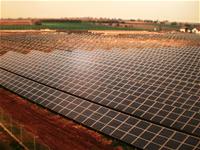 The Bulgarian Government must have a clear, predictable and transparent policy in support of renewable energy sources (RES) to be able to attract investors, while creating conditions for sustainable growth of the sector instead of a "green bubble". This message was conveyed by participants in the Solar Balkans 2011 Business Forum, organised by the Bulgarian Photovoltaic Association (BPvA).
The Bulgarian Government must have a clear, predictable and transparent policy in support of renewable energy sources (RES) to be able to attract investors, while creating conditions for sustainable growth of the sector instead of a "green bubble". This message was conveyed by participants in the Solar Balkans 2011 Business Forum, organised by the Bulgarian Photovoltaic Association (BPvA).
Sebastian Zeidler with Canadian Solar called on Bulgaria to learn from the mistakes 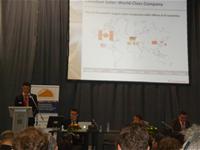 of Spain and the Czech Republic, where the photovoltaic market boomed until 2010 and thereafter made a sharp fall. The main reasons for the overheating were inflexible and too high feed-in tariffs and frequent changes of government policy.
of Spain and the Czech Republic, where the photovoltaic market boomed until 2010 and thereafter made a sharp fall. The main reasons for the overheating were inflexible and too high feed-in tariffs and frequent changes of government policy.
Germany is a good example of how to achieve sustainable long-term growth in the sector. (What a surprise!) The country is the largest solar market in the world with 7.4 GW newly installed capacity in 2010, with 40-50% share of the global solar market, 10 000 companies and over 130 thousand people employed in the sector. The proof that the industry is on a truly sustainable path is that from 2017 it will not require financial support.
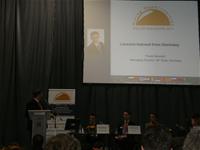 Frank Niendorf with BP Solar of Germany listed the key factors for a successful and sustainable solar market: the state support to be limited in time, until the photovoltaic sector becomes competitive; the feed-in tariff to be flexible, while reflecting the technological development and price reduction, as well as differentiated, depending on the type of renewable energy, technology, region, size of the installation etc. Last but not least - amendments to be made with a transparent and predictable rhythm.
Frank Niendorf with BP Solar of Germany listed the key factors for a successful and sustainable solar market: the state support to be limited in time, until the photovoltaic sector becomes competitive; the feed-in tariff to be flexible, while reflecting the technological development and price reduction, as well as differentiated, depending on the type of renewable energy, technology, region, size of the installation etc. Last but not least - amendments to be made with a transparent and predictable rhythm.
From the words of Mr Niendorf another reason for the German success became clear - the country develops the whole cycle from technologies and innovation to the production of all necessary equipment that provides a much wider presence of the sector in the economy, more employment and conditions for a sustainable growth.
Bulgaria can learn from the French experience not to create excessive incentives for the photovoltaic sector, which later to be sharply removed, as the French government did, Fabrice Juquois, President of the French company Photeist told the forum. Too high feed-in tariffs lead to too high profitability, which attracts too many investors from other businesses and the market becomes too large. The problem with speculation is also reported in Italy, which is the second largest solar market in the world after Germany.
Speculators are a problem for the Bulgarian solar society too. The large percentage of speculative solar projects can be explained by lower investment in the preparatory phase, easy preparation and expected rapid implementation, is stated in the recommendations of Confederation of Employers and Industrialists in Bulgaria (CEIBG) for the development of the renewable energy sector. According to the business organisation, most projects for photovoltaic systems are developed to an early stage and offered for sale, but only a small portion continues with the design and implementation. Therefore, measures are needed to sift quality projects aimed at long-term development.
The President of the Bulgarian Photovoltaic Association (BPvA) Nicola Gazdov 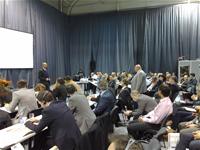 expressed concerns of the sector over the new draft legislation on renewable energy, currently being discussed in the parliamentary economic committee. The sector is unhappy because the duration of contracts for compulsory purchase of photovoltaic energy is reduced from 25 to 20 years. The PV business is opposing the proposal the feed-in tariff to be determined after the facilities receive the so called Act 15 (the document which verifies that the construction is completely finished), arguing that no bank would provide financing of a project when it is unclear at what price the energy would be sold. Some clarity and predictability is also needed on how the tariff will change in time because it will provide certainty for investors.
expressed concerns of the sector over the new draft legislation on renewable energy, currently being discussed in the parliamentary economic committee. The sector is unhappy because the duration of contracts for compulsory purchase of photovoltaic energy is reduced from 25 to 20 years. The PV business is opposing the proposal the feed-in tariff to be determined after the facilities receive the so called Act 15 (the document which verifies that the construction is completely finished), arguing that no bank would provide financing of a project when it is unclear at what price the energy would be sold. Some clarity and predictability is also needed on how the tariff will change in time because it will provide certainty for investors.
On paper, Bulgaria has a policy to promote the renewable energy sector, which is also expressed in the draft law. The country must comply with the European target the share of renewable energy to reach 20% of overall consumption by 2020, for Bulgaria the objective is 16%. According to Minister of Economy and Energy Traycho Traykov "to achieve this rate we should have about 2 000 MW installed capacity. We currently have about 300 MW of wind and 30 MW of PV.” However, it is unclear how much new capacities are agreed and whether it is possible they to be connected to the grid, although they are legally entitled to a guaranteed access. This is also a part of the problem with the sifting out the speculative projects in order to avoid an overall moratorium.
Another big unknown prevents the determination of the Bulgarian position on the subject - Belene NPP. Because, ultimately, the country must choose whether to pay for expensive nuclear power or for expensive green electricity, but not for both. According to the Minister of Economy and Energy, the electricity produced by the NPP Kozloduy currently has the lowest price - 42 BGN per MWh (21.5 euro). The price of Maritsa East TPP is 55 BGN (28.2 euro), of the remaining coal plants – 80-90 BGN (41-46 euro), of the Maritsa East 1 and 3 TPP - 130 BGN (66.6 euro) per MWh. The tariff for wind energy is 160 BGN (82 euro) per MWh, for biomass energy - 220 BGN (112.8 euro) and for PV is 760 BGN (389 euro) per MWh.
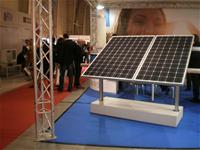 Despite the expectations the price of green energy to fall, it will remain higher than that of conventional sources for a long time. So in this case the state has to make a strategic choice not just whether to pay that price, and how to ensure sustainable development of the sector, in order Bulgaria not to turn into another example of a green bubble. And while the industry is discussing the challenges and the members of parliament are reshaping the new draft legislation at the last moment, it became clear what the state actually thinks on the issue from the transcript of the Government meeting on April 6. What is green energy and if it’s worth to invest in it - Prime Minister Boyko Borissov explains:
Despite the expectations the price of green energy to fall, it will remain higher than that of conventional sources for a long time. So in this case the state has to make a strategic choice not just whether to pay that price, and how to ensure sustainable development of the sector, in order Bulgaria not to turn into another example of a green bubble. And while the industry is discussing the challenges and the members of parliament are reshaping the new draft legislation at the last moment, it became clear what the state actually thinks on the issue from the transcript of the Government meeting on April 6. What is green energy and if it’s worth to invest in it - Prime Minister Boyko Borissov explains:
„Colleagues, haven’t you noticed that everyone wants to invest in green energy, all major companies worldwide, billions of euro? I am asking you, why is this great interest? Why don't they want to invest in infrastructure, in the second, third and fourth, but all had grappled the green energy? Do you want me to tell you why? Because the purchase price is in the range of 300 to 800 BGN (153-410 euro). Who will pay that price? The population or the state. And state can take the money only from the population.
Let me explain it to you with a single word. At a first glance, the ordinary viewer, reader, listener, having heard - we produce energy from wind, for free - when it starts blowing and we begin to profit. Or the solar energy - the sun rises, we begin to profit. Or take the biomass - the fallen branches and leaves from the forest and begin to produce energy. Why do we need the NPPs, TPPs, HPPs at all? Doesn’t it sound this way? Yes but no. Because we are obligated to buy this energy at 300, 200 or X BGN, this is many times more expensive than the price for the electricity produced in the Kozloduy NPP - 42 BGN.
So when you hear someone to talk about, and everyone wants to invest in solar panels made in China, bring them and put them on arable land and Traykov [the Minister of the Economy and Energy] is obliged to redeem it from them for 800 BGN. Is the sun for free for you? Do you see - this is populism ... Is the sun for free, when they say that Belene NPP is expensive? It is expensive, but this is many times more expensive.”*
Does this sound like we have a choice to you? I think the choice has already been made. Currently the only purpose is to delay in order to satisfy the lobbying interests and public opinion simultaneously. Ultimately, the taxpayers will pay for the choices made by their elected representatives on their behalf and at their expense. In the end of the day, these are the risks of democracy.
*euinside has kept the original stylistics of Mr Borissov's speech as it is in the transcript
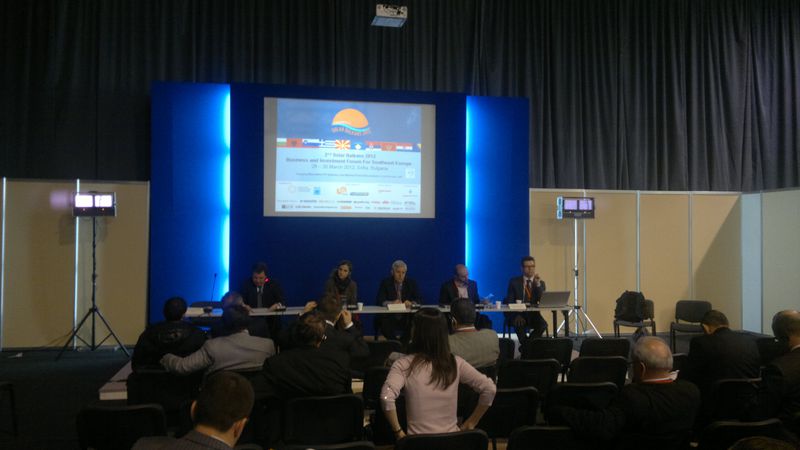 | © euinside
| © euinside | © euinside
| © euinside | © euinside
| © euinside